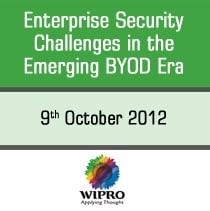| With rapidly changing ways to communicate via social media channels and even faster technology advances in the computing space, companies are increasingly finding themselves having to evaluate a major trend that also entails risks among its many advantages: BYOD (Bring your own device). While BYOD opens a variety of opportunities to increase efficiency and streamline and simplify business processes, it also leads to concerns with regard to the security of confidential customer information and business data.
The challenge of using mobile devices (smartphones, Tablets, laptop PCs) is that corporate data used by employees on the go falls outside the company’s direct ‘sphere of influence’. At the same time CIOs are increasingly being asked to allow employees convenient mobile working conditions, but ensure full compliance with legally mandated security and risk mitigation safeguards.
The biggest concern of IT decision-makers dealing with emerging technologies like BYOD and Cloud Computing are the loss of corporate data and control of data, a reflection of the known threats and risks of data leakage into the public domain.
While omnipresence is one of the biggest reasons behind the success of mobile devices, it also has an inherent risk associated with it – mobile devices are easily lost or stolen, making the data on such devices highly vulnerable. When corporate data is accessible via a personal mobile device, organizations suddenly lose a great deal of control over who can access that data.
Enterprise mobility security solutions propose systems to prevent unauthorized access to enterprise applications and / or corporate data on mobile devices. These can include password protection; encryption and / or remote wipe technology, which allows an administrator to delete all data from a misplaced device. With many systems, security policies can be centrally managed and enforced. Such device management systems are programmed to support and cooperate with the application programming interfaces (APIs) from various device makers to increase security compliance without increased effort.
As security is one of the main priorities for enterprise IT departments, it is important to determine which corporate applications can be accessed from an employee-owned device. IT departments need to be able to manage device and access policies, preferably from a single point of control, so IT can ensure security policies relating to VPN, anti-virus software, activation of personal firewalls or use of encryption are enforced.
Security issues around non-managed devices are on the rise, with a majority of IT executives admitting to experiencing a security problem related to an employee with an unprovisioned device. Company IT managements need to consider not only the value of their data and the risk of losing it, but also the potential loss of reputation and related implications.
|








